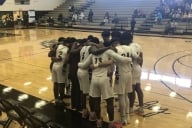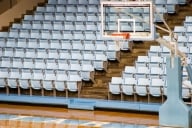You have /5 articles left.
Sign up for a free account or log in.
It may seem counterintuitive that the National Collegiate Athletic Association would take no issue – formally, at least – with University of North Carolina at Chapel Hill athletes taking no-show classes whose illegitimate passing grades would ultimately count toward the students’ athletic eligibility. The NCAA requires that, in order to compete, athletes continue down a consistent academic path toward their degree, earning at least six credit hours each term and meeting minimum grade point averages, which vary depending on an institution's own standards for graduation.
Sports columnists expressed dismay with the NCAA's lack of action. "NCAA concludes no rules were broken in UNC's academic scandal," CBS's Bruce Feldman tweeted. "Huh?"
But the African and Afro-American Studies classes, in which students (not all of whom were athletes) received grades for work that was not actually reviewed and had little to no faculty supervision or contact, did not explicitly violate any NCAA rules. The only case of an athlete taking the classes and being declared ineligible had less to do with the class itself than with the academic tutor from whom he received special benefits. (The tutor apparently helped former football player Michael McAdoo plagiarize in a paper for the class.)
A subsequent investigation by UNC officials found no evidence that students who had taken any of the 54 classes from 2007-11 – including multiple athletes -- had received grades without submitting written work. Nor was there any indication that athletes received “more favorable treatment” than non-athletes. And the faculty members involved did not appear to have received any “tangible benefit” from their actions.
“If someone is not given something based upon their status as an athlete, the NCAA has no jurisdiction,” said Chuck Smrt, president of the Compliance Group, which consults athletics departments and conferences on NCAA rules. “The extra benefit legislation is defined as, if it’s a benefit that’s not generally available to all students. Now, I think it’s very different to say that it’s not contrary to NCAA legislation. But it is a matter of jurisdiction.”
That’s why the NCAA had no legislative problem with the no-show classes, but saw fit to slap California Institute of Technology with a lack of institutional control violation related to courses and eligibility. Athletes were technically competing without being enrolled in enough classes during the first few weeks of school when they do “course shopping” -- exploring different classes before deciding to register for any. In effect, the athletes weren’t enrolled full-time -- a requirement clearly stipulated by NCAA rules.
The NCAA did not punish Auburn University when a similar case unfolded during 2006-8. In that instance, some alleged that the university used the classes to keep athletes eligible.
Of course, the NCAA recently deviated from its traditional jurisdiction in a very high-profile way in its dealing with Pennsylvania State University, with a $60 million fine, scholarship reductions and vacation of wins because of criminal activity on the part of a former coach. But that was a very special exception, Smrt said.
“Here’s what I think they’re saying: if university administrators have knowledge of such egregious criminal activity and don’t do something about it, then you’re liable,” Smrt said. What happened at UNC, of course, is far from criminal. And, once administrators caught on to what appeared to be going on, they alerted the NCAA.
The association, which declined to comment for this article, is in the process of reviewing and trimming down its massive rule book, and theoretically could address questions such as these. But the goal is to simplify the rules, not complicate them even further, so that’s unlikely, Smrt said. However, he does expect the NCAA’s recently raised academic requirements and initial eligibility standards will trigger more academic integrity cases.
But the onus for ensuring courses are legitimate lies with the institution, not the NCAA, said Jason Lanter, a professor of psychology at Kutztown University and past president of the Drake Group, which is critical of college sports’ effect on academic integrity.
“I think everyone was shocked that there were no violations of eligibility of any type,” Lanter said. “At the same time, I think the NCAA has taken a stance that it is not their purview…. What we need to do from a higher education standpoint is hold people accountable to make sure the education that not just athletes but all students are receiving is worthwhile.”
Both Lanter and Michael Bowen, co-chair of the steering committee for the Coalition on Intercollegiate Athletics, an alliance of faculty senates from NCAA Football Bowl Subdivision schools, say cases like those at UNC are purely institutional issues.
“The NCAA should not be in the business of regulating the internal affairs of a university – it doesn’t seem right,” Bowen said. “Universities have to control their curriculum, and the university’s in the best place to judge whether it’s an appropriate course for their students to take.”
Bowen believes situations like this should serve to rally faculty who want to preserve academic integrity as athletics grow more and more influential.
“It may be necessary for the faculty to take action and say no, or to try to regain a strong enough faculty voice that they can influence the situation in the name of the integrity of the institution, if it’s not otherwise being upheld,” he said. “If we can’t trust the integrity of the faculty, we’re in trouble.”
Professor Julius Nyang’oro was forced out even after he resigned as chair of the department in question. And according to a recent update from Chancellor Holden Thorp, as part of its response to the scandal, UNC wants to “strengthen faculty involvement in athletics,” with specific attention to how the Faculty Athletics Committee can better ensure academic integrity and “full integration” of athletes into the campus.
"Faculty must and will be visibly engaged," Thorp told the Faculty Council at its meeting Friday.
At that meeting, the Faculty Council approved a resolution reaffirming Thorp's actions in response to the "academic irregularities." A separate resolution the council approved affirmed "the integrity and validity of the intellectual disciplines" in the African and Afro-American Studies department. The faculty "expresses our solidarity with this members of the faculty of that department whose professional lives and work have been in no way connected with academic irregularities," the resolution says.
The question of integration will also be addressed in a review led by Hunter Rawlings, president of the Association of American Universities, to explore what the future relationship between athletics and academics should look like. That review of athletics’ role at UNC was prompted by a Faculty Executive Committee’s own review noting concern that “because of the special demand placed on them, students who are competing in Division I sports will face substantial impediments to being fully integrated into the life of the university."
The university also plans to reorganize its academic support for athletes program and hire a new director, who will report “solely” to the College of Arts and Sciences. The college is also adding two new academic advisers to its staff (the athletic department has done the same, to strengthen compliance and communication), and will “enhance its training and supervision” of advisers.
Former North Carolina governor James G. Martin is currently leading an investigation into potential academic irregularities prior to 2007.








